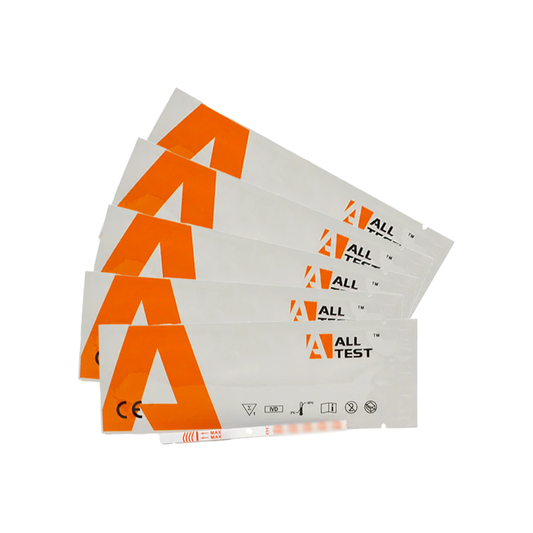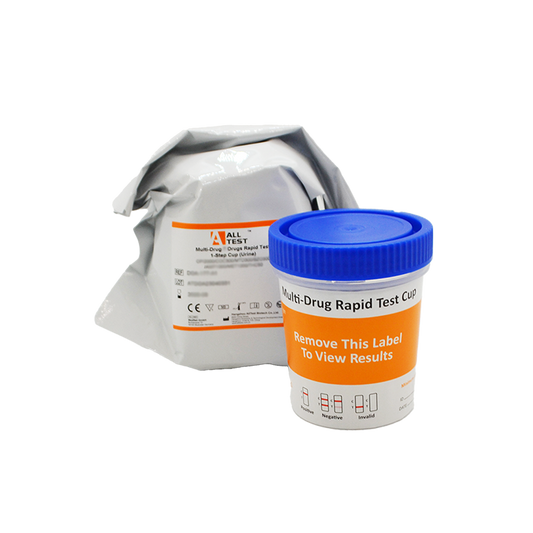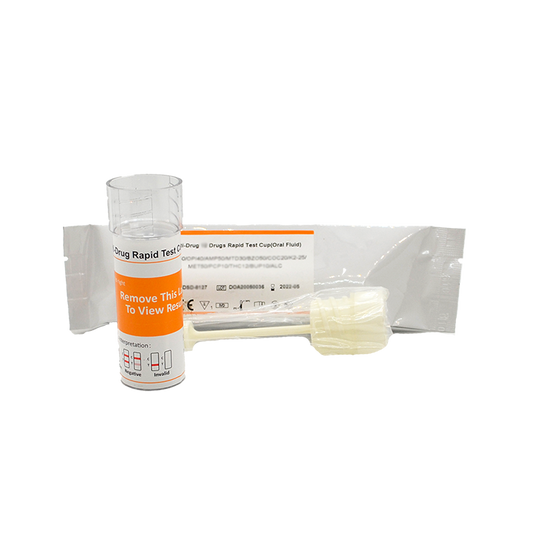Benzodiazepines
If you've taken a drug test recently either at home, at work, or in a clinical setting you may have noticed the abbreviation "BZO" on the results panel. But what exactly does BZO mean, and why is it important?

Saliva Drug Test Barrel (UKDrugTesting)
From £7.95
BZO stands for Benzodiazepines, a class of psychoactive drugs commonly prescribed for conditions like anxiety, insomnia, and seizures. While benzodiazepines can be medically beneficial, they also pose significant risks when misused. In this article, we'll explore what benzodiazepines are, the various types, how they work, their dangers, and the importance of testing for them along with the accuracy of the BZO strip and potential causes of false positives or negatives.
What Are Benzodiazepines?
Benzodiazepines, often referred to as “benzos,” are a class of central nervous system (CNS) depressants. They work by enhancing the effect of gamma-aminobutyric acid (GABA), a neurotransmitter that slows down brain activity. This makes them effective for calming anxiety, promoting sleep, and controlling muscle spasms or seizures.
Benzodiazepines can be easily abused due to their calming, euphoric, and sedative effects. Individuals may misuse them by taking higher doses than prescribed, using them without a prescription, or combining them with other substances like alcohol or opioids to intensify the effects. This kind of abuse can quickly lead to tolerance, where the body requires more of the drug to achieve the same effect, and dependence, where the user feels unable to function without it. Recreational users often seek benzos for their ability to reduce anxiety and induce relaxation, but chronic misuse can result in addiction, memory problems, impaired judgment, and severe withdrawal symptoms. Because of their high potential for misuse, benzos are among the most commonly abused prescription drugs.
Common Types of Benzodiazepines
There are many types of benzodiazepines, and they vary in potency and duration of action. Common examples include:
- Alprazolam (Xanax) – Prescribed for anxiety and panic disorders.
- Diazepam (Valium) – Used for anxiety, alcohol withdrawal, and muscle spasms.
- Lorazepam (Ativan) – Often used pre-surgery to calm nerves and for anxiety.
- Clonazepam (Klonopin) – Treats panic disorders and seizures.
- Temazepam (Restoril) – Prescribed for short-term treatment of insomnia.
- Chlordiazepoxide (Librium) – Common in alcohol withdrawal treatment.
These drugs are typically available by prescription and are classified as Schedule IV controlled substances in the U.S., indicating they have recognized medical use but also potential for abuse and dependency.
Sources of Benzodiazepines
Benzodiazepines are legally manufactured by pharmaceutical companies and dispensed via prescription. However, they are also frequently diverted for recreational use, sold illegally on the street, or obtained through fraudulent prescriptions. In some regions, counterfeit benzos may be laced with even more dangerous substances, like fentanyl, raising the risk of overdose and death.
Dangers of Benzodiazepine Use
When used as prescribed and monitored, benzodiazepines can be effective. However, misuse comes with serious risks, including:
- Addiction and dependence
- Overdose, especially when mixed with alcohol or opioids
- Cognitive impairment and memory loss
- Withdrawal symptoms, which can include seizures and psychosis
- Impaired motor skills, increasing the risk of accidents
Chronic use or misuse may lead to long-term cognitive issues, depression, and other psychiatric complications.
Why Drug Test for Benzodiazepines?
At Home
Parents may test teens or young adults for benzo use if they suspect prescription misuse or behavioral changes. Home drug tests can offer peace of mind or early intervention. While benzodiazepines are generally not the first-line treatment for children, they may still be prescribed in specific cases, such as severe anxiety, seizures, or pre-surgical sedation. As a result, benzos may be present in the home medicine cabinet, making them more accessible for experimentation or misuse by curious teens. In households where a family member is prescribed benzodiazepines, there’s a higher risk of diversion and abuse, especially if the medication isn’t securely stored. This makes at-home drug testing a valuable tool for early detection and prevention.
Recommended Test - Urine Cup
Why is this the best home drug test for benzos? We recommend a urine cup for testing benzos at home so you can get the longest period of detection, where testers are more interested in overall use of the drug, not current impairment.
In the Workplace
Employers, especially in safety-sensitive industries (e.g., transportation, healthcare, construction), test for benzos to ensure employees are alert, unimpaired, and safe on the job. Benzos can significantly impair reaction time and decision-making.
Recommended Test - Saliva Barrel
Why is this the best workplace drug test for benzos? We recommend using a saliva barrel for workplace drug testing, as saliva provides a more targeted indication of recent use and current impairment. Saliva tests are also significantly easier to administer without specialized facilities. However, it's important that all testers watch the instructional video provided on the product page before conducting the test. A common issue is insufficient saliva collection, which can lead to invalid results, proper technique is essential for accurate outcomes.
In Clinical or Rehab Settings
Drug testing for benzodiazepines is common in treatment centers, psychiatric facilities, and pain management clinics to monitor compliance and prevent abuse.
Does the BZO Strip Detect All Benzodiazepines?
The BZO test strip in a urine drug test is designed to detect benzodiazepine metabolites, most commonly oxazepam, a breakdown product found in several benzos.
However, not all benzodiazepines are equally detectable by standard urine tests:
Benzos Likely to Trigger a Positive BZO Test:
- Diazepam (Valium)
- Alprazolam (Xanax)
- Lorazepam (Ativan)
- Temazepam (Restoril)
- Chlordiazepoxide (Librium)
Benzos That May Not Trigger a Standard BZO Test:
- Clonazepam (Klonopin) – Often not detected unless the test is specifically calibrated to detect 7-aminoclonazepam, its primary metabolite.
- Etizolam – A thienodiazepine (not technically a benzodiazepine), often missed by traditional BZO strips.
- Triazolam (Halcion) and Midazolam (Versed) – May be undetectable depending on test sensitivity and timing.
If accurate detection of all benzos is needed, specialized lab tests or expanded drug panels (e.g., GC-MS or LC-MS) may be required.
Can Non-Benzos Trigger a False Positive on a BZO Test?
Yes, certain substances can cause a false positive for benzodiazepines in urine drug screens. These include:
- Sertraline (Zoloft) – An SSRI antidepressant
- Oxaprozin (Daypro) – A nonsteroidal anti-inflammatory drug (NSAID)
- Tolmetin – Another NSAID
- Efavirenz – Used in HIV treatment
False positives are more common in immunoassay tests, which are faster and cheaper but less specific. If a false positive is suspected, confirmatory testing with GC-MS (gas chromatography-mass spectrometry) is recommended.
Can Anything Cause a False Negative?
Yes, false negatives can occur when:
- The drug has cleared the system before the test (benzos generally stay detectable for 2–10 days depending on the type, dose, and frequency of use).
- The test is not sensitive enough to detect certain benzos or their metabolites.
- Diluted urine reduces drug concentrations below detection thresholds.
- Unusual metabolism or liver function alters how benzos are broken down and excreted.
Some users may even attempt to tamper with tests, but modern drug screens have ways to detect adulteration or dilution.
Final Thoughts
Understanding what "BZO" means on a drug test is essential for making informed decisions whether you're a parent, employer, healthcare provider, or just curious. Benzodiazepines can be incredibly helpful medications but also pose serious risks when misused. Drug testing, particularly with accurate and comprehensive panels, plays a vital role in preventing abuse, protecting safety, and promoting accountability.
If you're considering drug testing at home or in your workplace, make sure to choose a reliable test and understand both its capabilities and limitations. And if in doubt, always follow up with confirmatory lab testing for definitive results.




